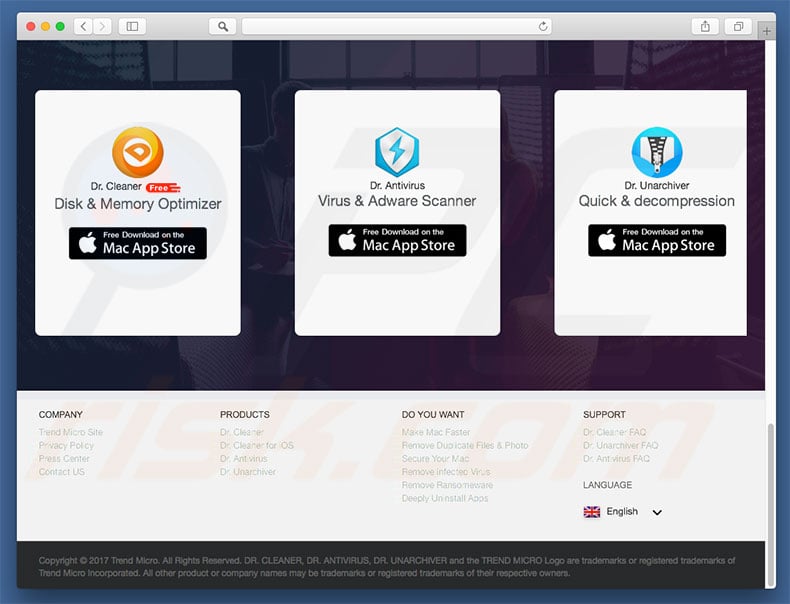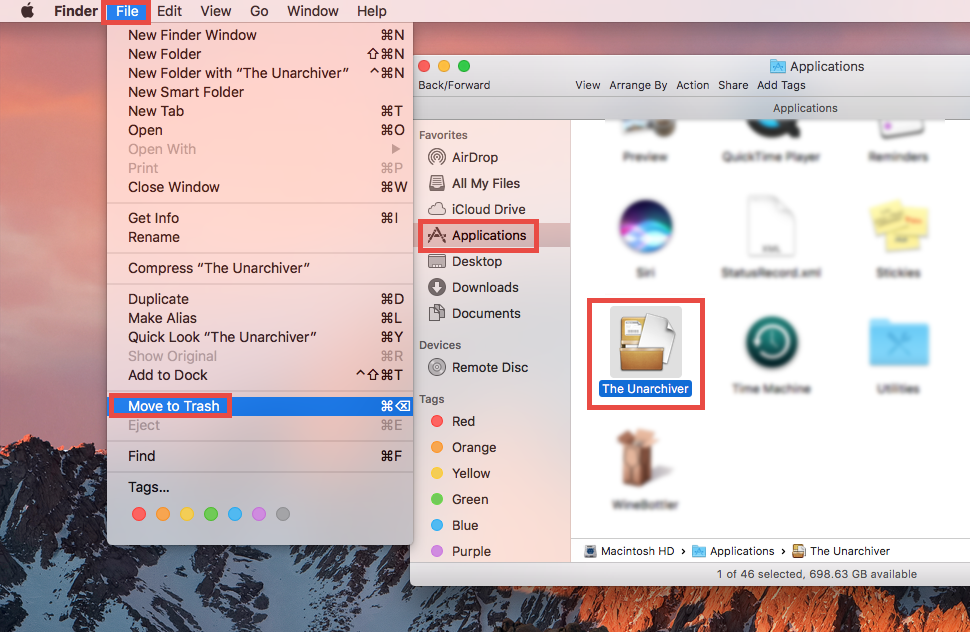After the Adware Doctor Mac App Store security fiasco and the report confirming that dozens if not hundreds of iOS apps sold location data to third parties unbeknownst to their users, Apple is again under fire regarding its App Stores' review rules and approval mechanisms.
Unarchiver is the app that lets you browse the contents of archived files and also open files directly from archives.
The Unarchiver is a small and easy to use program that can unarchive many different kinds of archive files. It will open common formats such as Zip, RAR (including v5), 7-zip, Tar, Gzip and Bzip2. It will also open many older formats, such as StuffIt, DiskDoubler, LZH, ARJ and ARC. It will even open other kinds of files, like ISO and BIN disc. The list of products includes Dr. Cleaner Pro, Dr. Unarchiver, and Duplicate Finder. In the past, these applications were considered legitimate, but they were subsequently modified to record certain information stored on computers. Trusted Mac download Dr. Virus-free and 100% clean download. Unarchiver alternative downloads.
According to evidence gathered by the Malware Bytes Labs and a few other security researchers and hobbyists, Dr. Antivirus, Dr. Cleaner, Dr. Unarchiver, Open Any Files, and possibly more, are other macOS apps accepted by Apple into their Mac App Store which surreptitiously collect and send large amounts of sensitive data to servers such as browsing history and lists of installed apps.
The four apps are now removed from the Mac App Store, after multiple reports to Apple during the last two days. They were all available within the store for the entirety of this year and had thousands of ratings (fake or real) with the number of installs being almost as high.

Malware Bytes Labs says in their report that all apps mentioned above have been observed to collect and exfiltrate the full browsing history for Safari, Firefox, and Google Chrome, as well as a complete list of all apps installed and downloaded on the user's Mac.
The most important issue at this time, besides Apple's security blunder, is if the Dr. Antivirus, Dr. Unarchiver, and Dr. Cleaner macOS apps have been developed and published by the reputable Trend Micro Incorporated security company given the fact that the two apps have been using their name as the developer.

Dr. Antivirus, Dr. Cleaner, Dr. Unarchiver, and Open Any Files are the new culprits

Although Trend Micro neither confirmed or denied it, there is evidence which connects the security company to the entity behind Dr. Antivirus, Dr. Unarchiver, and Dr. Cleaner, seeing that the SSL certificates for both the trendmicro.com and the drcleaner.com domains are issued to Trend Micro Inc. Logitech g910 g hub. by the AffirmTrust CA.
Download walking dead subtitles. Even though Apple has removed the apps already reported during the last few days from the Mac App Store, there are still a number of Trend Micro macOS apps left (i.e. App Uninstall, Network Scanner, and Dr. Wifi) which should probably be checked for similar spyware-like behavior.
At this point, one has to wonder why Apple's (Mac) App Store approval process is so flawed that apps which gather and share private user data with third parties pass their 'strict' guidelines and end up tarnishing the company's reputation.
Trending topics twitter. Also, why would they act so slow in removing apps which have been confirmed to have spyware behavior by numerous security experts, in some cases leaving them in the App Store for up to an entire month after the initial report?

Maybe the time has come that Apple changes its App Stores' (iOS and Mac) testing and approval strategy by focusing more on the quality of the apps instead of their numbers.
Because how can you even mention that the company's focus is on protecting the users' privacy and security when some of the apps you deem 'safe' and distribute through your official stores / channels do the exact opposite?
After the security blunder most of its Mac App Store apps were a part of the last few days, Trend Micro published an apologetic public letter with findings resulting from an internal investigation.
Dr Unarchiver Mac Malware
According to reports from the Malware Bytes Labs coupled with multiple other ones from a large list of security researchers published two days ago, Trend Micro's Dr. Antivirus, Dr. Cleaner, and Dr. Unarchiver macOS apps were proven to collect and send sensitive users data to remote Internet servers.
After the news reached Apple's ears, all three apps were removed from the Mac App Store, together with Dr. Cleaner Pro, Dr. Battery, and Duplicate Finder, a few other apps made by the same company.
The problem was that besides Dr. Antivirus and Dr. Cleaner, an anti-malware and a disk cleaning application, none of the other apps (e.g., an archive expander and a battery monitoring tool) could have any claim of needing to collect any data from the hard disk of the Mac they were installed on.
Moreover, an even bigger problem was that users were not asked at any moment if they agree to have their private data such as browsing history and lists of installed apps.
Dr Unarchiver Malwarebytes
Trend Micro blames shared libraries and codebase for accidental browsing history collection
In their public apology letter following this incident, Trend Micro says that users could have read the apps' EULA on its support site, where they could have found out exactly what type of data their apps collected and sent to remote Trend Micro servers.
The EULA web page for the Dr. Cleaner app clearly states that the Trend Micro apps were collecting the user's browser history, and a host of system information data such as physical memory, system uptime, and UUID.
There is no mention of their apps collecting and exfiltrating a complete list of all the apps installed and downloaded, or of a list of all running processes as found out by Malware Bytes Labs in their research.
Dr Unarchiver Windows
According to Trend Micro, the culprits behind this mishap are not their developers but the use of shared libraries within all their apps and the browser history feature being added to all of them.
Trend Micro finished their letter stating that they removed the browsing history collection features from all the apps outed from Apple's Mac App Store, deleted all the logs they gathered on their US-based AWS servers, and made sure that their security-focused and non-security apps will use different codebases from now on.
Dr Unarchiver Malware Reviews
Apple just announced prior to this incident, on August 31, that the App Store Guidelines were updated to ask all app developers to include a privacy policy with all their product releases and updates to aid in the review process starting with October 3.
